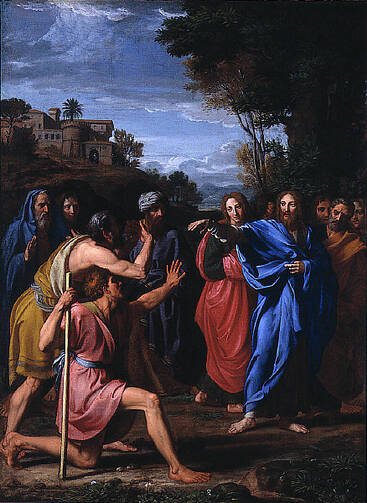Steve Jobs ended his 2005 Stanford commencement speech by urging his audience, "Stay hungry. Stay foolish." For Jobs, remaining hungry and foolish was the path to authenticity. It was the way to live a life that, in his words, didn't rely on the results of another's thinking.
His closing words came to mind recently as I ruminated on the way that men and women in the New Testament approach Jesus. Except I thought of a variation on the Jobs theme: "Stay hungry. Stay foolish. Stay desperate."
Desperation is not popular. We associate desperation with instability, with a situation that has to be fixed or cured. Though desperation evokes pity and compassion, the world prefers those who are strong and self-confident, those who pilot their affairs with sturdy tranquility. This is for good reason. Communities and countries need resilient and responsible people; they need adults capable of braving the wiles of fortune
At the same time, desperation creates channels for faith. Those who come to Jesus are often in shambles. They are often sick, worried, and frantic. They do not have it all figured out. They are not concerned with protocol or formalities. They aren't cool and sophisticated, at peace with themselves and the world.
Matthew's Gospel tells us that people "brought [Jesus] all the sick, those afflicted with various diseases and pains, demoniacs, epileptics, and paralytics . . . " The Centurion pleading for Jesus' help describes his (the Centurion's) servant as in "total distress." Jairus, a ruler of the synagogue, coming upon Jesus, "fell at his feet, and begged him, saying, 'My little daughter is at the point of death.'" (Mk 5:21). The Syrophoenician woman, whose daughter was possessed, acts similarly; she "came and fell down at [Jesus'] feet" and "she begged him to cast the demon out of her daughter." (Mk 7:26)
At one point during Jesus' ministry, a blind man cries out, "Jesus, Son of David, have mercy on me!" When the crowds following Jesus rebuke him, the blind man "cried out all the more, 'Son of David, have mercy on me!'" (18:38-39). At this, "Jesus stopped, and commanded him to be brought to him . . ."
The examples go on. Over and over in the New Testament, the people whom Jesus heals, the people whom Jesus spends time with, are those who struggle. They are sick and vulnerable and confused. They are sinful and stifled and searching. They fall down and cry out.
Among a number of lessons from these passages, I want to point out just a few.
The people whom Jesus heals don't come to Jesus because they've worked out the intellectual questions surrounding his identity. The blind man, the bleeding woman and the grieving father came to Jesus because they were blind, bleeding, and grieving. They came to him because they had nowhere else to turn. Their wounds empowered faith. Their imperfections initiated courage. Faith produced the healing, not knowledge.
Those encounters invite us to examine our own efforts to achieve perfect clarity or perfect social smoothness. We might ask: how do we let our own desperation bring us to the feet of Jesus? In a culture of abundance and advanced medicine (an abundance and medicine that is by no means universal), how do we listen to our anguish? This takes extraordinary introspection and discernment. We are just as blind as the blind man. Perhaps not physically, but that doesn't matter. We might have perfect vision and yet see nothing.
The men and women of the Gospel renounce their control and place their trust entirely in Jesus. Do we ever do that? How often do we cry out, pleading for the Lord? How often do we risk the silence that follows?








